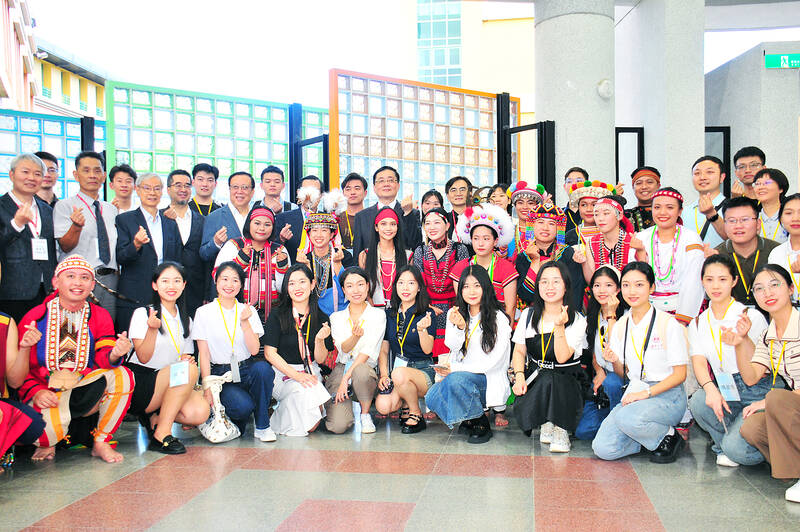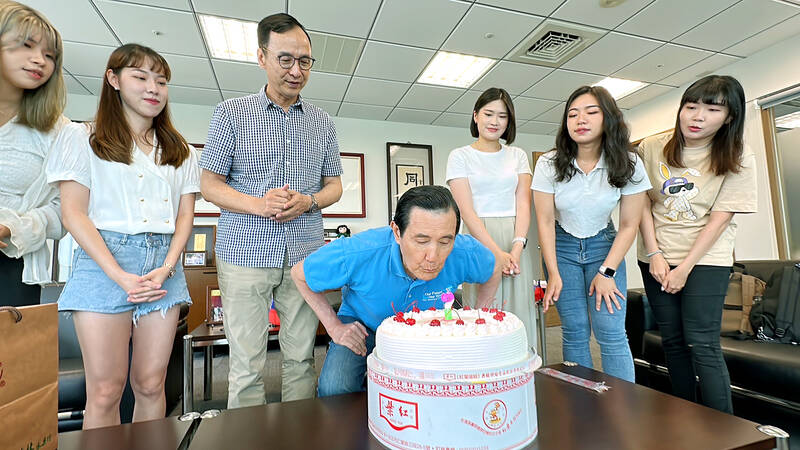Earlier this year former president Ma Ying-jeou (馬英九) lead a delegation to the People’s Republic of China (PRC), proclaiming for the millionth time that the people on both sides of the strait are “Chinese” and arguing for “peace.” This month, he lead an “exchange” program of students and teachers from the PRC to Taiwan to visit major tourist sites and have exchanges with students.
Ma said in his application to the government that the purpose of the trip was that the PRC participants “would learn about the local culture and people of Taiwan, and pass on positive messages to promote the better development of cross-strait relations.”
Note that, for Ma, Taiwan has only “local culture.” It has long been his policy to treat Taiwan’s unique culture as a subset of Chinese culture. Ironically, the party is visiting Sun Moon Lake (日月潭) and Jioufen (九份), two sites whose modern configuration is a bequest of Japanese colonialism, one of the many sources of Taiwan’s difference.

Photo: Hua Meng-ching, Taipei Times
‘UNITED FRONT’ WORK
The final group, approved by the government, consisted of 37 teachers and students from five universities in China. A legislator from the Democratic Progressive Party (DPP) quoted in the Taipei Times said last month that: “Our understanding is that some of the students were chosen in their early years at universities by Chinese Communist Party (CCP) officers at each school to be groomed for party membership.”
These contentions probably have some basis in fact, since there is no way random students and teachers from the PRC would ever be permitted to visit Taiwan in a group like this. As John Dotson noted in an excellent piece published in April by the Global Taiwan Institute, these exchanges are “carefully controlled and stage-managed by organizations within the CCP’s ‘united front work’ (統戰工作) bureaucracy. Within this framework, ‘youth exchanges’ (青年交流) are a major focus of united front work.”

Photo courtesy of the KMT
Since this is an obvious “united front” operation against Taiwan, the phrase “better development of cross-strait relations” can only mean movement toward the annexation of Taiwan. This phrase is a common high-sounding euphemism: whenever the words “cross-strait progress” or similar are invoked, one should ask “toward what end?”
Less often challenged is Ma’s absurd claim that the students learning about the “local culture and people of Taiwan” will promote better relations. It seems almost axiomatic, one widely repeated by commentators, and yet it is utter nonsense.
Consider: it’s 2023 and there are over 300,000 wives from the PRC married to local men. Some of them have even formed their own pro-PRC political party. Did they communicate nothing about the PRC to locals? Taiwan’s universities once hosted thousands of PRC students as well.
Consider too: millions of Taiwanese have lived, worked, run factories and businesses and toured in the PRC. Remember when the Hong Kong-Taipei air route was the busiest on earth? There’s a large population of Taiwanese expats there today, in addition to people working temporarily. Tens of billions in trade takes place annually.
Taiwanese have been visiting China since the 1990s in large numbers, but family visits have been permitted since 1987. That decision, as several scholars have noted, was the moment Taiwanese began to realize how deeply different the two societies were, a key factor in the democratic and culture shifts of the 1990s.
All these Taiwanese know China well.
Even if no one ever crossed the strait, Taiwanese would still know China intimately. The media reports on the PRC incessantly. PRC entities advertise on most major social media platforms, and own many of the social media that Taiwanese use daily, including shopping and video platforms. Taiwanese gamers play an enormous variety of PRC-made video games, through which they interact with official interpretations of Chinese history and culture, along with innumerable PRC citizens. Taiwanese encounter PRC nationals as they travel, do business and attend universities all over the world.
This experience calls into question the unspoken assumption of such exchanges that if the two sides know each other better, the tensions will ease. Reality is just the opposite. The more the Taiwanese see of the PRC, the less they want to be part of it. Witness the recent exodus of Taiwanese from the PRC in the wake of the horrible lockdowns and the increasingly stringent security state.
UNFAVORABLE VIEWS
They are hardly alone. A widely-cited Pew poll released on Wednesday showed that Americans of Chinese origin had extremely unfavorable views of China, unlike other immigrant groups who generally held their homelands in high regard. Chinese regularly emigrate to freer countries.
Of course, Hong Kong residents are now voting with their feet, with large numbers either leaving or looking for a way out. Hong Kong is often cited as an analogue of Taiwan’s future.
Nor can the PRC be said to be ignorant of Taiwan. They have similarly wide contacts with Taiwanese. Taiwanese and PRC researchers study every aspect of each other’s culture, politics, economy and military. The two sides know each other well.
All these intimate, variegated contacts of Taiwanese with the PRC have taken place even as the PRC has ramped up tensions with Taiwan and built up its military for the last two decades. It is not difficult to see that mutual copious, fine-grained knowledge has not lead to reductions in tensions. Quite the opposite.
People-to-people exchanges cannot reduce tensions because tensions are caused by the desire of CCP elites to kill Taiwanese (and their own people) to annex Taiwan. When those decisions change, tensions will ease.
Ma’s reasonable-sounding excuses for the “exchange” trip must be viewed in that light. Ma does not need to engage in stunts to stay relevant politically as he remains a potent force within the Chinese Nationalist Party (KMT) — his hatchet man, former KMT secretary-general King Pu-tsung (金溥聰), is the party’s presidential campaign manager. He certainly knows his trip will have no effect on the PRC-Taiwan relationship. Is he openly leading a training trip for future Taiwan experts of the PRC, helping them to cultivate contacts and spread disinformation?
Surely he must know that this exchange is merely another “united front” operation to the PRC. In other words, it sure looks like just another indicator of the willingness of the KMT leadership to front for CCP interests in Taiwan.
Notes from Central Taiwan is a column written by long-term resident Michael Turton, who provides incisive commentary informed by three decades of living in and writing about his adoptive country. The views expressed here are his own.

A vaccine to fight dementia? It turns out there may already be one — shots that prevent painful shingles also appear to protect aging brains. A new study found shingles vaccination cut older adults’ risk of developing dementia over the next seven years by 20 percent. The research, published Wednesday in the journal Nature, is part of growing understanding about how many factors influence brain health as we age — and what we can do about it. “It’s a very robust finding,” said lead researcher Pascal Geldsetzer of Stanford University. And “women seem to benefit more,” important as they’re at higher risk of

Eric Finkelstein is a world record junkie. The American’s Guinness World Records include the largest flag mosaic made from table tennis balls, the longest table tennis serve and eating at the most Michelin-starred restaurants in 24 hours in New York. Many would probably share the opinion of Finkelstein’s sister when talking about his records: “You’re a lunatic.” But that’s not stopping him from his next big feat, and this time he is teaming up with his wife, Taiwanese native Jackie Cheng (鄭佳祺): visit and purchase a

April 7 to April 13 After spending over two years with the Republic of China (ROC) Army, A-Mei (阿美) boarded a ship in April 1947 bound for Taiwan. But instead of walking on board with his comrades, his roughly 5-tonne body was lifted using a cargo net. He wasn’t the only elephant; A-Lan (阿蘭) and A-Pei (阿沛) were also on board. The trio had been through hell since they’d been captured by the Japanese Army in Myanmar to transport supplies during World War II. The pachyderms were seized by the ROC New 1st Army’s 30th Division in January 1945, serving

The People’s Republic of China (PRC) last week offered us a glimpse of the violence it plans against Taiwan, with two days of blockade drills conducted around the nation and live-fire exercises not far away in the East China Sea. The PRC said it had practiced hitting “simulated targets of key ports and energy facilities.” Taiwan confirmed on Thursday that PRC Coast Guard ships were directed by the its Eastern Theater Command, meaning that they are assumed to be military assets in a confrontation. Because of this, the number of assets available to the PRC navy is far, far bigger